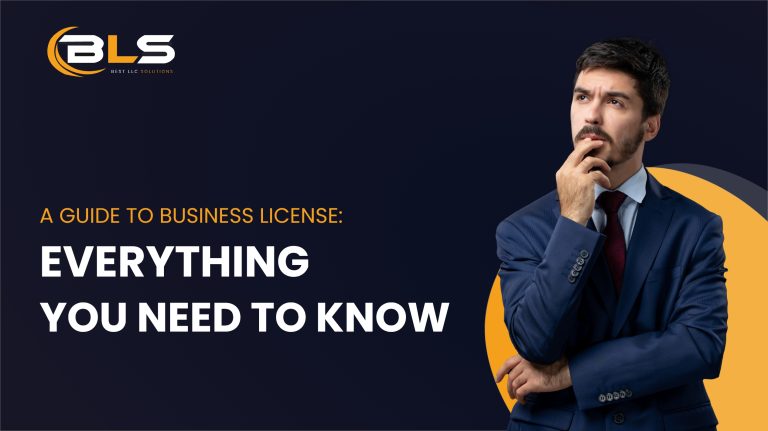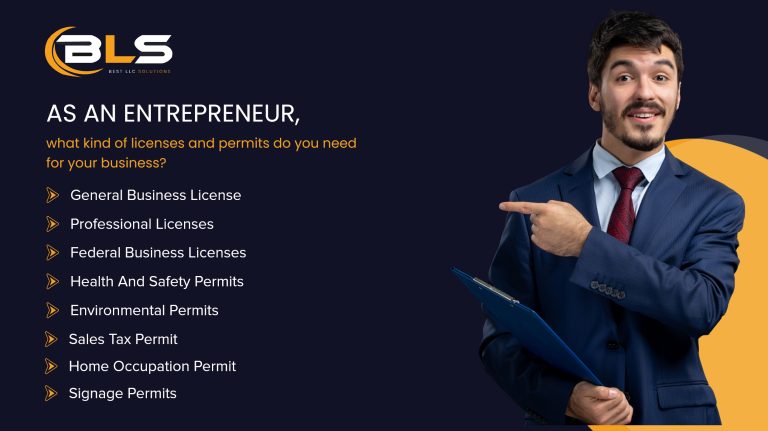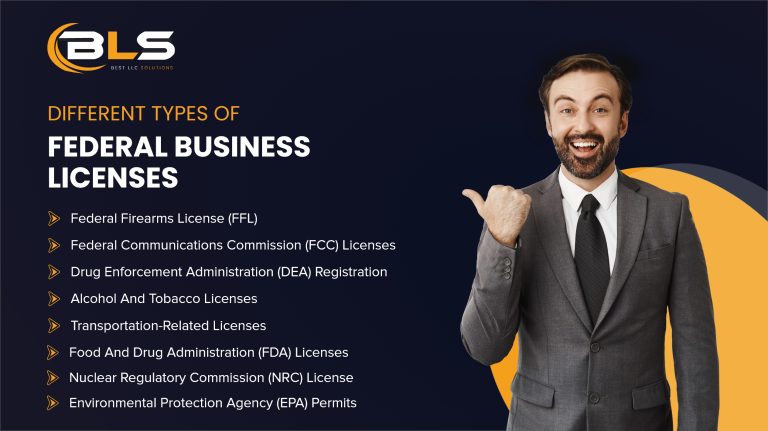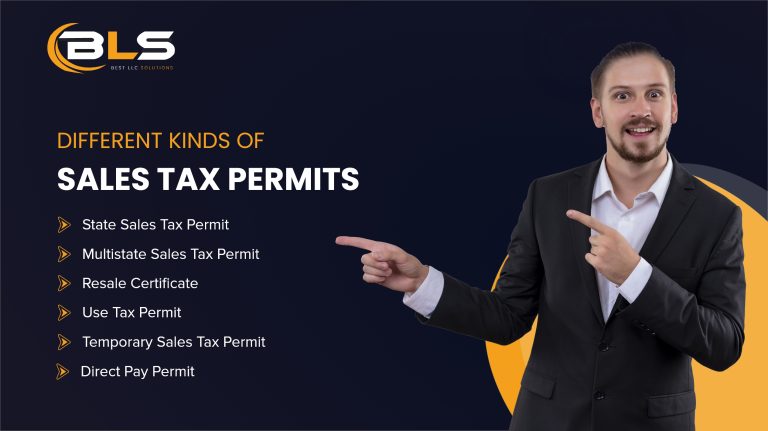A Guide to Business License: Everything you need to know

By Bazal Razzaq
Chief Editor
Updated: July 07, 2023
Editorial Note: We earn a commission if you use the services recommended on this page. Commissions do not affect our opinions or recommendations.
- How to change your LLC name in 2023?
- How to set up an LLC as a Non-US resident
- What Is A Foreign LLC?
- Mastering the Art of Maintenance: Things To Do After Setting Up An LLC
- Exploring the Basics: What is a Single Member LLC?
- The Power of Partnership: Unleashing The Potential of A Multi Member LLC
- C Corp vs LLC – Which Business Structure is Right for You?
- Which is the best state to form an LLC in?
- Unlocking the Benefits of an LLC (Limited Liability Company)
- Operating Agreement 101: A Key To A Successful LLC
- One LLC, Multiple Streams of Income: can you have multiple businesses under one LLC?
- Articles of Organization Made Easy: Everything You Need to Know
- What Is A LLC Annual Report: A Comprehensive Guide for Business Owners
- Exploring Eligibility: Who Can Be LLC Members?
- What Is A Domestic Limited Liability Company?
- What is An EIN, and Do You Need One?
- What Is a Registered Agent, and Why Does Your Business Need One?
- What is a Series LLC?
- How to start a business with no money in 6 steps
- Member Managed vs Manager Managed LLC – Which Structure Fits Your Business?

We know how exciting it is to start your own LLC! But, when you start your business, it’s really important to follow all the legal rules, like getting the right licenses. This guide will explain the different licenses you might need for your business so that you can understand them easily.

General Business License
The general business license, often known as a local business license, is the most basic type of license you need for almost all businesses, including LLCs. This license allows your LLC to operate legally within a specific city or county. To get a general business license, you need to follow certain rules set by your state. We highly recommend contacting your local government or municipal office to determine exactly what you need to do and how much it will cost.
The licenses needed for an LLC can vary depending on your location and business type. Here are some general business licenses that an LLC might need:
- Business Registration License: This license is required to officially register your LLC (Limited Liability Company) with the government agency that handles business registrations. It ensures that your business is recognized and operates within the law.
- State Business License: A local business license permits your LLC to operate within a specific state or county. It ensures that your business follows the rules and laws of your area. This license grants permission to conduct business within the state and may involve additional fees or regulations.
- Sales Tax License: If your LLC sells taxable goods or services, you need a sales tax license to collect and cancel sales taxes to the state or local tax authority.
- Employer Identification Number (EIN): As you may already know, obtaining an EIN from the Internal Revenue Service (IRS) is important for taxation and hiring employees. It acts like a unique identification number for your LLC.
- Health Department Permit: If your LLC is involved in food service, such as a restaurant or catering business, you’ll need a health department permit to ensure compliance with food safety regulations.
- Professional or Occupational Licenses: In some states, jobs like doctors, lawyers, accountants, architects, and contractors need special licenses to work legally. These licenses usually require certain education, training, or experience as determined by professional regulatory agencies.
- Zoning Permit: Depending on the type of business you have and its location, you may need a special permit called a zoning permit. This permit permits you to run your business in a particular area. This permit is necessary to ensure your business follows the local rules and regulations about where it can operate. It confirms that your business is in an area suitable for its specific purpose.
- Fire Department Permit: Some LLCs may need fire department permits, especially those operating in industries involving fire hazards or public safety concerns. These permits ensure compliance with fire safety regulations. You need to apply for these permits if you own businesses such as bars, nightclubs, or manufacturing facilities.
It’s essential to remember that this list isn’t the ultimate guide, and the licenses you need for your LLC may differ depending on where you are, what industry you’re in, and what your business does. We absolutely recommend consulting with your local government authorities or a business attorney who can walk you through the licensing process specific to your LLC.
Professional Licenses
Yes, we did discuss it earlier. We know. But, we thought a special section indicating this necessary license would help our readers gain in-depth insight into this very elaborate section.
So, as we were saying, certain business types require professional licenses to operate legally. You might need a professional license if your LLC falls into a regulated profession or offers specialized services.
Doctors, lawyers, accountants, real estate agents, contractors, and cosmetologists are typical examples of businesses needing these licenses. You may have to meet specific education, training, or experience criteria mandated by the relevant regulatory bodies to obtain a professional license.
When operating as an LLC, you may need specific professional licenses depending on the nature of your business. Here’s a list of different professional licenses:
Medical and Healthcare Professions:
- Medical Practitioners (Doctors, Surgeons, Dentists)
- Nurses and Nurse Practitioners
- Pharmacists
- Physical Therapists
- Chiropractors
- Psychologists and Psychiatrists
- Occupational Therapists
- Optometrists
- Speech Therapists
- Home Healthcare Providers
Legal and Financial Professions:
- Lawyers and Attorneys
- Accountants and Certified Public Accountants (CPAs)
- Financial Planners and Advisors
- Insurance Brokers and Agents
- Real Estate Brokers and Agents
- Mortgage Brokers and Loan Officers
- Investment Advisors
Skilled Trades and Construction Professions:
- General Contractors
- Electricians
- Plumbers
- HVAC Technicians
- Roofers
- Carpenters
- Painters
- Landscapers and Gardeners
- Welders
- Masons
Creative and Artistic Professions:
- Photographers
- Graphic Designers
- Interior Designers
- Architects
- Event Planners
- Tattoo Artists
- Hair Stylists and Barbers
- Estheticians and Beauticians
- Music Instructors
- Dance Instructors
Consulting and Professional Services Professions:
- Management Consultants
- IT Consultants
- Human Resources Consultants
- Marketing Consultants
- Public Relations Consultants
- Engineering Consultants
- Environmental Consultants
- Security Consultants
- Education Consultants
- Business Coaches
Education and Training Professions:
- Teachers and Instructors
- School Administrators
- Tutoring Centers
- Driving Schools
- Vocational Training Centers
- Music Schools
- Dance Schools
- Fitness Trainers and Instructors
- Yoga Instructors
- Language Instructors
Technology and Software Professions:
- Software Developers
- Web Designers and Developers
- IT Support and Network Specialists
- Data Analysts
- Cybersecurity Specialists
- Systems Administrators
- Computer Repair Technicians
- App Developers
- E-commerce Specialists
- Digital Marketers
Again, this list is not an all-important element. There can absolutely be many more types of licenses and permits you may need for your LLC. As mentioned earlier, the licenses required for your LLC can vary based on your location, industry, and business activities. We absolutely recommend consulting with a lawyer or local government authorities to guide you through the licensing process specific to your LLC.

Federal Business Licenses
In addition to state and local requirements, some businesses must obtain federal licenses to operate legally. These licenses are typically industry-specific. You can obtain them through certain federal agencies.
While the specific federal business licenses required for an LLC depend on the nature of its activities, here are some examples of federal licenses that may be necessary for certain types of businesses:
- Federal Firearms License (FFL)
- Federal Communications Commission (FCC) Licenses
- Drug Enforcement Administration (DEA) Registration
- Alcohol and Tobacco Licenses
- Transportation-related Licenses
- Food and Drug Administration (FDA) Licenses
- Nuclear Regulatory Commission (NRC) License
- Environmental Protection Agency (EPA) Permits
It’s important to note that this is not an exhaustive list, and the federal licenses required for an LLC can vary widely based on industry, location, and specific business operations. Therefore, conducting thorough research and consulting with relevant federal agencies is crucial to determine the licenses and permits necessary for your LLC.
Health and Safety Permits
Health and safety permits are essential for businesses that handle food, provide medical services, or deal with hazardous materials. For instance, if your LLC operates a restaurant, a daycare center, or a chemical manufacturing plant, you’ll need health and safety permits. These permits ensure your business complies with regulations to safeguard public health and minimize potential risks.
Different health and safety permit that an LLC may need depend on the nature of its business operations. Here’s a list of some common health and safety permits that may be required:
- Food Service Permit: If your LLC operates a restaurant, food truck, or any other establishment involved in the food business, you will likely need a food service permit. This permit ensures that your business follows proper food handling, storage, and hygiene practices to maintain public health and safety.
- Health Facility License: If your LLC provides medical services, such as a clinic, nursing home, or outpatient facility, you will need a health facility license. This license ensures compliance with health and safety standards specific to the healthcare industry.
- Child Care License: LLCs operating child care centers, preschools, or daycares must obtain a child care license. This license ensures that your facility meets the required safety, health, and staffing standards to provide children with a secure and nurturing environment.
- Hazardous Materials Permit: If your LLC works with dangerous stuff like chemicals, things that catch fire easily, or radioactive materials, you might have to get a special hazardous materials permit. This permit ensures that your business handles, stores, transports, and gets safely rid of these materials to prevent accidents and keep the environment safe.
- Fire Safety Permit: Some LLCs, particularly those operating in commercial spaces, may require a fire safety permit. This permit verifies that your business premises comply with fire safety codes, including adequate fire exits, fire alarms, fire suppression systems, and employee training in fire safety procedures.
- Occupational Safety and Health Administration (OSHA) Permits: If your LLC works with dangerous stuff like chemicals, things that catch fire easily, or radioactive materials, you might have to get a special permit called a hazardous materials permit. This permit ensures that your business handles, stores, transports, and gets safely rid of these materials to prevent accidents and keep the environment safe.
OSHA permits may include confined space permits, excavation permits, hot work permits, or permits for specific hazardous tasks. These permits ensure that your business adheres to safety regulations and protects the well-being of your employees.
- Swimming Pool Permit: If your LLC operates a swimming pool for public or private use, you will likely need a permit.
It’s important to note that the specific permits required can vary by location and industry. Therefore, it is essential to research the regulations specific to your LLC’s location and consult with the appropriate regulatory agencies to determine the exact health and safety permits your LLC needs to obtain.
Environmental Permits
Certain LLCs might require environmental permits, especially if their operations impact the environment. Waste management, chemical production, or construction industries often need these permits.
Environmental permits ensure that businesses adhere to environmental protection standards and practices, helping to conserve natural resources and minimize pollution.
Depending on their operations’ nature and potential environmental impact, different LLCs may require environmental permits. Here is a list of some common environmental permits that LLCs may need to obtain:
- Air Quality Permits: LLCs involved in activities that emit air pollutants, such as manufacturing plants, power generation facilities, or refineries, may need air quality permits. These permits ensure compliance with emission standards and help battle air pollution.
- Water Discharge Permits: LLCs that discharge wastewater or stormwater into bodies of water, such as rivers or lakes, may require water discharge permits. These permits regulate the quality and quantity of pollutants that can be released, protecting water resources from dirt and contamination.
- Hazardous Waste Permits: If your LLC generates, stores, transports, or disposes of hazardous waste materials, you may need a hazardous waste permit. This permit ensures proper management, storage, and disposal of hazardous waste, minimizing the risk of environmental pollution.
- Wetland Permits: LLCs involved in projects that impact wetlands, such as land development or construction near wetland areas, may need wetland permits. These permits aim to protect the ecological functions of wetlands and may require mitigation measures to offset any adverse impacts.
- Stormwater Permits: LLCs with facilities or operations that could contribute to stormwater runoff, such as construction sites, industrial facilities, or large parking areas, may need stormwater permits. These permits require implementing best management practices to control and treat stormwater runoff, reducing the impact on water quality.
- Endangered Species Permits: If your LLC’s activities have the potential to impact endangered or threatened species, you may need an endangered species permit. These permits ensure compliance with regulations to protect vulnerable plant and animal species and their habitats.
- Noise Permits: Certain LLCs that generate excessive noise levels, such as entertainment venues or manufacturing facilities, may need noise permits. These permits establish noise limits and requirements for soundproofing or noise reduction measures to prevent excessive noise pollution in surrounding areas.
- Emissions Trading Permits: In some cases, LLCs involved in activities that emit greenhouse gases or other pollutants may need emissions trading permits. These permits allow companies to participate in emissions trading programs to buy and sell emission allowances to meet regulatory requirements.
It’s important to note that the specific environmental permits required for an LLC can vary depending on the industry, location, and scale of operations.

Sales Tax Permit
If your LLC sells goods or services subject to sales tax, you need to apply for a sales tax permit from your state’s tax authority. This permit allows your business to collect and remit sales taxes to the appropriate government agency. Remember that the specific requirements for obtaining a sales tax permit can vary by state, so it’s crucial to understand your state’s tax laws and regulations.
Here’s a list of different sales tax permits that an LLC may need, depending on the nature of its business and the states it operates in:
- State Sales Tax Permit: Most LLCs selling tangible goods or certain taxable services must obtain a state sales tax permit. This permit allows the LLC to collect sales tax from customers on behalf of the state and remit it to the appropriate tax authority.
- Multistate Sales Tax Permit: If your company operates in different states, you might have to get a special multistate sales tax permit. This permit enables you to collect and remit sales tax in each state where your business has a nexus (significant presence).
- Resale Certificate: Sometimes, an LLC may not need to pay sales tax on items purchased for resale. Instead, they can provide a resale certificate to suppliers, which exempts them from paying sales tax at the time of purchase. The resale certificate proves that the items will be resold and subject to sales tax when sold to the end consumer.
- Use Tax Permit: Use tax is a tax imposed on the use, storage, or consumption of taxable items purchased without paying sales tax. You might need a special use tax permit if your business buys things from vendors in other states or online stores that don’t charge sales tax. This permit allows you to calculate and pay the tax to your state.
- Temporary Sales Tax Permit: If your LLC participates in events that happen only for a short time or during certain seasons, like trade shows, fairs, or exhibitions, you might need a temporary permit to charge sales tax. This permit allows you to collect and remit sales tax specifically for the duration of the event.
- Direct Pay Permit: An LLC may qualify for a direct pay permit in certain circumstances. This permit allows the LLC to pay the sales tax directly to the state instead of paying it to vendors at the time of purchase. The direct pay permit is often granted to businesses with substantial taxable purchases.
Home Occupation Permit
A home occupation permit may be necessary for entrepreneurs running their LLCs from home. This permit ensures that your home-based business follows the rules of your local area and doesn’t disturb the residential environment of your neighborhood. You should submit a home occupation permit application and pay a fee depending on your locality.
Signage Permits
You may need signage permits if your LLC plans to display signs or banners on your business premises. These permits ensure that your signage adheres to local size, placement, and aesthetics regulations. Before putting up any signs, check with your local government to determine if a signage permit is required.
Final Word
In conclusion, applying for and obtaining necessary business licenses and permits is important in setting up and running a legit business, especially LLC. It helps ensure compliance with legal requirements and gain trust and credibility among customers, investors, and partners.
Additionally, staying informed about changes in licensing regulations and additional permits is crucial as your LLC grows and evolves. You need to regularly review and renew your licenses to maintain compliance and avoid any problems in your business activities.
Remember maintaining compliance is not just a legal obligation. It’s an investment in the growth and sustainability of your business.
Featured Best LLC Services
Northwest Registered Agent

On Northwest Registered Agent’ Website
Highlight
IncFile

On IncFile’ Website
Most Comprehensive
Business Rocket
On Business Rocket’ Website
Frequently Asked Questions (FAQs)
A business license is a document government officials provide that permits your business to operate legally within a particular state. There are different kinds of business licenses and permits you may require depending on the type and location of your business.
If you’re starting a business, no matter which entity you own, there’s a good chance you’ll need a business license to operate legally. If you choose to function without a business license, remember it could very well get you in unwanted trouble. This trouble may mean fines, limitations on your business activities, and, in some extreme cases, even jail time.
No, an LLC is not a business license. An LLC, a business entity, is a limited liability company. At the same time, a business license is a separate document that gives your company(even LLC) permission to operate/function legally within a particular state or area.
